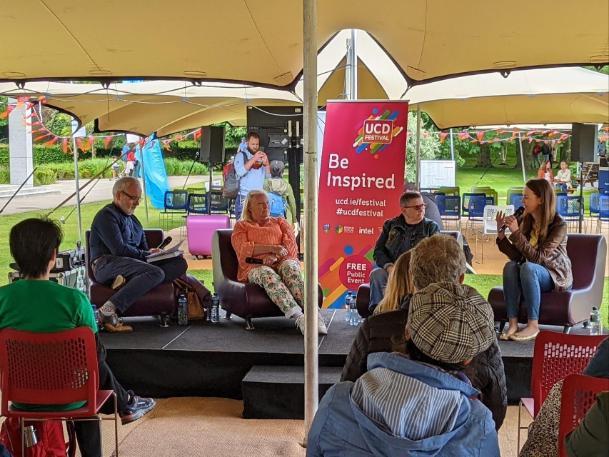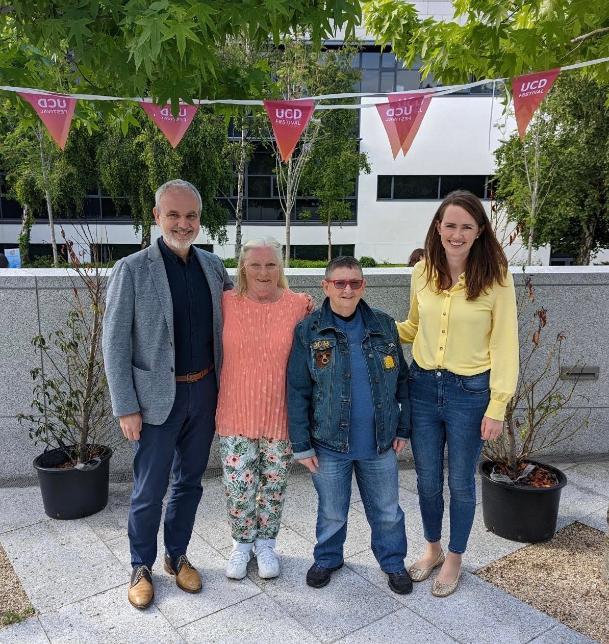Magdalene Laundries: Told, Acknowledged and Not Forgotten
News
- Celebrating a Decade of Fitzpatrick Family Foundation Research
- Conference for Early Career Academics on ‘Interdisciplinarity and Law’
- UCD Law Students win Cape Town Convention Moot Competition
- New Partnership announced with Matheson
- UCD scholarship honours late Declan McCourt
- UCD Environmental Law Field Trip to Brussels
- Taoiseach Micheál Martin launches Dr Niamh Howlin’s book marking the 50th Anniversary of the Offfice of the DPP
- Book Launch: Bridging the Gender Pay Gap through Transparency
- John M Kelly lecture 2025 delivered by Professor Kim Scheppele of Princeton
- Guest lecture by Mr Michael McGrath
- Professor Ian O'Donnell wins another book award!
- Ulysses Medal Awarded to Síofra O'Leary
- Professor Cathryn Costello and Dr Maebh Harding awarded ERC Consolidator Grants
- 'Soirée du Droit' hosted in UCD Sutherland School of Law
- Dr Niamh Howlin Book Launch in the Supreme Court
- Milestone Reunion of the Classes of 1984, 1994, 2004, and 2014
- John O'Donnell honoured with UCD Law Alumni Award 2024
- Mr. Declan McCourt RIP
- UCD Sutherland Opportunity Bursary
- Law Micro-credentials
- Special celebrations for the John M Kelly Lecture 2024 marking ten years in Sutherland School of Law
- ‘Digital Markets and the Law’: Workshop on emerging issues for businesses
- The James C Brady Prize Award winning students for 2022/2023
- Matheson Diversity in Law Newman Fellow appointed at UCD Sutherland School of Law
- Guide for 2024 Referendums on Family and Care
- Professor Aisling Swaine joins UCD Sutherland School of Law from UCD School of Social Policy, Social Work and Social Justice
- Aedamar Comiskey is honoured as Law Alumni Award Winner 2023
- The Bank of Ireland Finance Student Awards November 2023
- Milestone Reunion of the Classes of 1983, 1993, 2003 and 2013
- The new Individual Accountability Framework in Financial Services Ireland
- Leading scholar of EU Law and Labour Law appointed Full Professor at UCD Sutherland School of Law
- Court of Appeal Workshop
- Four Adjunct Professors Appointed to UCD Sutherland School of Law
- Launch of Barristers in Ireland: An Evolving Profession Since 1921 by Dr Niamh Howlin
- UCD SUTHERLAND OPPORTUNITY supported by MASON HAYES & CURRAN LLP BURSARIES
- Professor Ian O'Donnell wins US Criminology Book Award
- Four UCD Law students take part in Our Rule of Law Academy in Brussels
- International Conference on Education and Democratic Citizenship (ICEDC) hosted in Sutherland School of Law
- International Symposium “Entrenching a Global Health Emergency Mode: Implications for Health and Human Rights Law”
- John M. Kelly lecture 2023 delivered by Baroness Onora O’Neill
- The 1981 BCL Class celebrate forty years since graduation
- Minister Roderic O’Connor chairs panel at seminar hosted by UCD Centre for Constitutional Studies
- Leading scholar of international refugee and migration law appointed Full Professor at UCD Sutherland School of Law
- Caoilfhionn Gallagher KC appointed Adjunct Full Professor at UCD Sutherland School of Law
- Copy of Donnybrook Magdalene Laundry Book Presented to the President of Ireland
- UCD team wins the 2023 Corn Adomnáin – International Humanitarian Law Competition
- UCD Sutherland Opportunity supported by Mason Hayes & Curran BURSARIES
- HRER/ UCD Conference 12 June 2023: preliminary announcement and Call for Papers (deadline 13.03.23)
- Professor Gráinne de Búrca awarded UCD Honorary Degree of Doctor of Laws
- Further Learning in Employment Law
- UCD Law Team wins the National Moot Court Competition 2022
- Dr Michael F Farrell, human rights activist awarded Honorary Degree of Doctor of Laws
- UCD Law alumna, Judge Síofra O’Leary, appointed president of European Court of Human Rights
- Large numbers of Alumni attend the 2022 Milestone Reunion
- Portrait of Mrs Justice Catherine McGuinness
- Dr Lukasz Grzejdziak appointed to EU Project for sustainable reforms in Ukraine's justice sector
- Mr Justice Gerard Hogan launches ‘Palles: The Legal Legacy of the Last Lord Chief Baron
- Conferring of UCD Matheson PhD Scholar in Commercial Law
- UCD PhD Student Awarded Irish Research Council Funding
- Professor Laurent Pech appointed Dean at UCD Sutherland School of Law
- Magdalene Laundries: Told, Acknowledged and Not Forgotten
- Professor John D Feerick conferred with honorary Degree of Doctor of Law
- 2022 Matheson | UCD Leadership Series Crypto and the Digital Assets Revolution: What’s Next?
- Histories of Probation in Ireland: A Theoretical Analysis
- Three Upcoming Constitutional Law Conferences in UCD Sutherland School of Law
- Lord Hendy focuses on P&O Ferries for the 2022 Guest Lecture in Employment Law
- Lord Sumption delivers the 2022 John M. Kelly lecture to a large audience in UCD Sutherland School of Law
- Chief Justice Launches UCD Student Legal Services Journal 2022
- The Rt. Hon the Lord Mayor of the City of London, Alderman Vincent Keaveny visits UCD Sutherland School of Law
- UCD Law hosts Student Event on The European Strategic Autonomy with Admiral Mellett (ret.) and Colonel Dirou
- UCD Law Students Refugee Law Mooting Success
- Major Conference on Philanthropy hosted by UCD Sutherland School of Law
- Fourteen Law Students Awarded Medals at Bank of Ireland Prize Giving
- Professor Imelda Maher appointed Fellow at New York University
- 2022 Helga Pedersen Moot Court Competition
- Ad Astra Fellows, UCD Sutherland School of Law
- Sutherland Fellow in French Law 2021/22
- Legal History Research Group publishes new book
- Mentors Sought for UCD Law Students
- Alumnus Vincent Keaveny appointed Lord Mayor of the City of London
- Three Doctoral candidates awarded Irish Research Council Scholarships
- European Traineeship in Intellectual Property
- THE Rankings position UCD Sutherland School of Law as Ireland’s leading University Law School
- The Class of 2022
- News 2021
- News 2020
- News 2019
- News 2018
- News 2017
- News 2016
Magdalene Laundries: Told, Acknowledged and Not Forgotten

The College of Social Sciences & Law recently held a powerful panel discussion on the “Magdalene Laundries: Told, Acknowledged and Not Forgotten” at the 2022 (opens in a new window)UCD Festival on June 11.
Based on the book, “Ireland and the Magdalene Laundries: A Campaign for Justice”, authored by a number of UCD alumni and academics, this conversation examined how the Justice for Magdalenes campaign changed the mindset of Irish society and led to the Government’s announcement of a national site of research and remembrance. The discussion was facilitated by Colm O’Gorman, Executive Director of Amnesty International Ireland. The panel included UCD BCL alumna Dr Maeve O'Rourke, activist Mary Harney and Magdalene Laundry survivor Lyndsay Rehn.
Dr O’Rourke, Assistant Professor of Human Rights at the Irish Centre for Human Rights and School of Law, NUI Galway, who is also a co-author of the book, began by providing a realistic understanding of the historical background and explanation of how the book came about. Maeve explained,
“In 1993, Mary Rafertaigh found out that the nuns in High Park which was one of the 10 Magdalene Laundries. High Park in Drumcondra had sold some land and it turned out when Mary dug into this sale that they had managed to get a license for exhumation and cremation of 155 women without producing death certificates for the majority and without producing death certificates for the majority of them, without being able to name all of the women and that still remains to be the case today so the Justice for Campaign was in response to the fact that injustice is not historical. It was so clear then that it was ongoing and it’s so clear now that it is.
The book chronicles all of the work for Justice for Magdalenes and others did to bring about a State apology in 2013 to survivors of the Magdalene Laundries. It situates the Magdalene Laundries in that much broader context of institutional and family separation abuse that affected more than 1% of the Irish population in the 20th century. Professor Ian O’Donnell of UCD Sutherland School of Law and Eoin O’Sullivan (Trinity College Dublin) have demonstrated that by 1951 over 1% of the Irish population was incarcerated so the Magdalene Laundries is part of that whole system.”
Mary and Lyndsay shared their personal experiences and also focused on where things are currently at for the Campaign and what they’re hoping will happen in the near future to acknowledge the survivors and educate the nation.
Mary who was born in Bessborough Mother and Baby Institution illegally fostered and later sent to an industrial school from the age of 5-16, is determined that future generations of Irish citizens shall know, through education and memorialization the truth about Ireland's institutions and to ensure they are never forgotten.
Lyndsay is a Magdalene survivor who spent time in An Grianan and worked in the laundry as a young girl. Accompanied by a number of other survivors, Lyndsay instigated the Judicial Review to have An Grianan included in the Magdalene Redress Scheme. She opened the door for others in similar centres across the country to be added to the scheme.
For anyone who would like to learn more about the Magdalene Laundries and the Campaign for Justices, make sure to visit the Justice for Magdalene Research (opens in a new window)website.
The book can be purchased from a number of places including Dubray, Easons, Amazon and Waterstones. For more information on the authors and/or the book, click (opens in a new window)here.

From L to R: Colm O’Gorman, Lyndsay Rehn, Mary Harney and Maeve O’Rourke